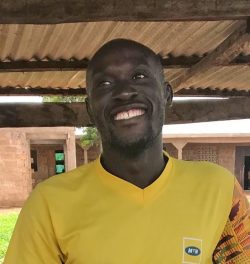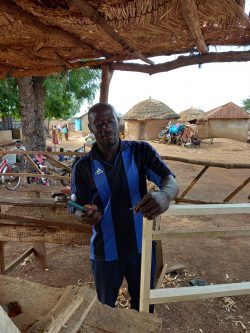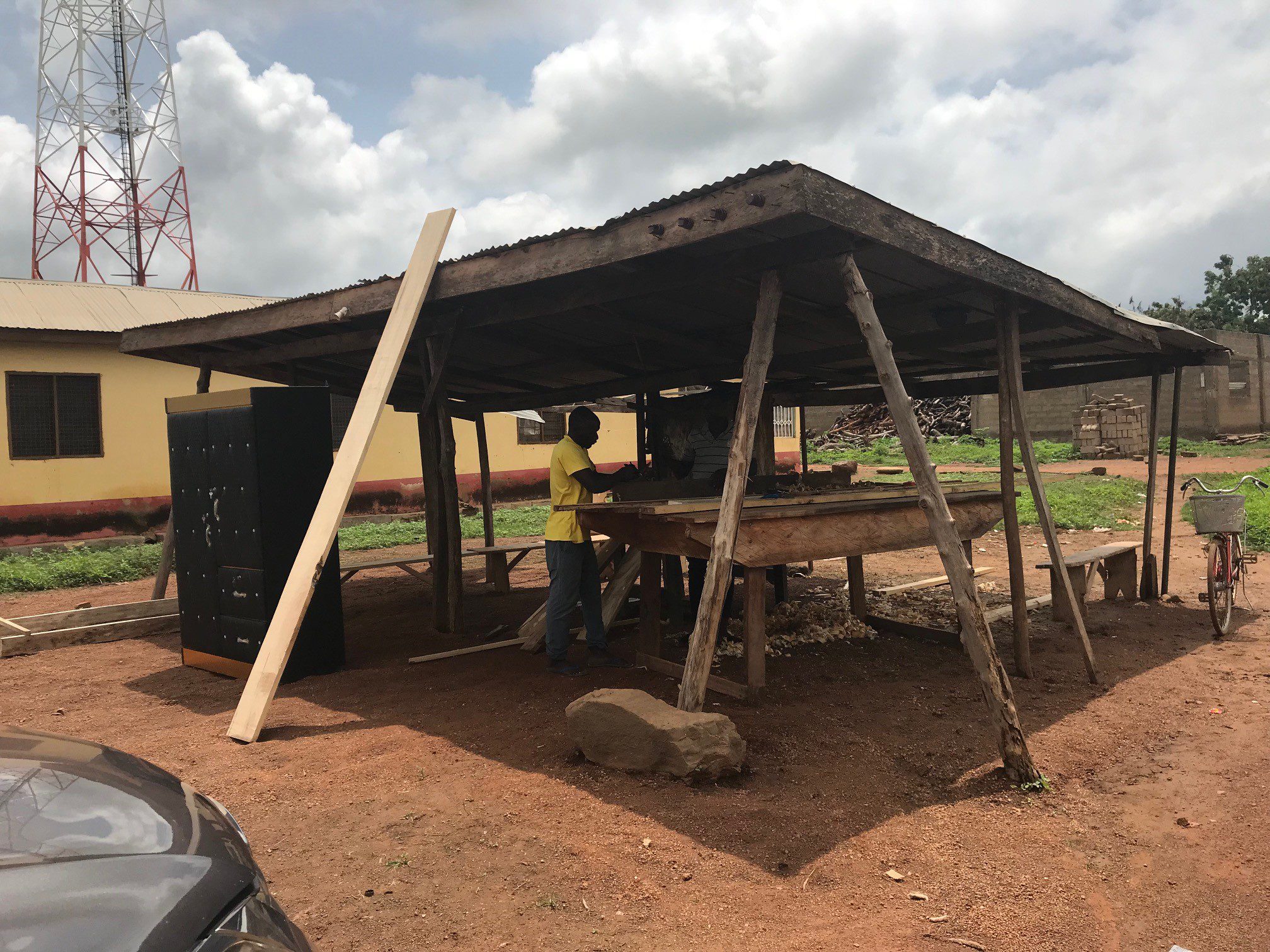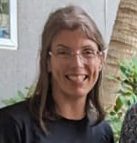

On the second leg of their visit to Ghana, Africal Progamme Manager, Ash Phillips, and Individual Giving Officer, Vicky Fernandes, joined our partner NORSAAC for a road trip to Karaga to catch up with Zakaria Selimana, former carpentry trainee.

Zakaria in his shop, August 2023
Leaving Tamale, the capital city of the Northern Region of Ghana, the tarmac road becomes an endless line of red earth, wide, potholed and busy with Tuk Tuks, people on motorcycles, people on foot. Everywhere there are goats: we wend our way around them in our vehicle. They remain totally unphased by the traffic. Chickens scratch along the verges and amongst the houses. Here, the dwellings are constructed from mud brick, thatch and corrugated metal. As we drive north, settlements give way to vast tracts of agricultural land, maize and rice plantations, little rivers and trees. The occasional termite mound punctuates the landscape. By the roadside, bright red and yellow bishop birds catch the eye, set like jewels amongst the bushes.
We arrive in Karaga two hours later and pull up outside the shop belonging to Zakaria, a graduate from our ‘Promoting Economic Independence’ project with Norsaac. Directly in front of Zakaria’s shop is a large wardrobe along with four benches and a door fame. Zakaria explains that these are the items he sells most of. He is in the middle of planing a length of timber to make another bench. Like the majority of items he sells, it is commission piece from people in the local community.
Our visit to Karaga has coincided with the wet season (from May to September) when the community turns to farming. Zakaraia explains that in the dry season, after the harvest, people’s will turn to finishing construction projects and demand for large items like door frames and windows will increase. For now, he is making smaller, take-home items like benches that he can sell from his shop.
Zakaria is keen to tell us what impact carpentry training has had on his life. Growing up, Zakaria lived with his uncle and they were reliant on subsistence farming to generate an income. His uncle couldn’t afford Zakaria’s school fees so Zakaria had to drop out of primary school and help his uncle on the farm. Zakaria’s friends told him about our vocational training project with Norsaac, and the opportunity it presented for earning a sustainable income. Asked why he chose to learn carpentry he says “I had an uncle who was a carpenter and I used to visit him at his shop. Through that, I developed an interest in the trade.”

Zakaria, May 2022
Zakaria started his carpentry training in the summer of 2020, on a work placement under the supervision of a senior or ‘master’ trainer. His training was from 7am until 5:30pm every Monday to Saturday. He had no previous experience, but soon learned how to construct roofing, window and door frames, shelving, wardrobes and how to upholster seating. He tells us he enjoyed learning new skills and achieving greater levels of proficiency with each task.
During his placement, Zakaria was paid by the senior carpenter for jobs he undertook. He was able to save some of this money and invest it for his future. When we met Zakaria in May 2022 he said “My basic needs are being catered for and I can afford small meals and clothes. I bought a sheep and hen for myself; the hen has begun producing chicks which I can sell.”
Zakaria received business skills training which helped him feel confident with setting prices, understand market penetration, and appreciate the pros and cons of using your own materials when taking on work. After graduating with a NVTI level 1 certificate in carpentry, Zakaria received a start-up kit of good quality carpentry tools and he established his own shop. He explains that he built the shop himself, but the plot of land is owned by his brother. He also received a start-up grant and Zakaria explains how it helped him buy materials to construct 3 benches and 4 gates. From the sale of these items, he made could afford materials for another bench and 2 more gates and sold these for a 200GHC profit.
Zakaria’s biggest news is that since starting his business, he has enjoyed sufficient financial security to get married. He was able to help his wife set up her own business as a weaver, making smocks, so that she can also contribute economically to their household. So Zakaria feels that both he and his wife have benefited from the training project. Zakaria has also been able to support his younger brother in school, helping with provisions including food, uniform and sunglasses.
Zakaria is saving his money through mobile banking. I ask him if he is saving up for anything in particular. He explains he is going to buy a plot of land to build a house for when his new family starts growing. He wants to make this happen in the next 3-4 years.
With regards to his business, Zakaria is hoping to get a bench mounted electric planing machine because it takes a long time using the manual plane, and he would also like a crosscut saw. In the future he intends to employ apprentices who are interested in learning carpentry.

Zakaria’s shop, Karaga
I ask Zakaria how customers find out about his shop. He says he mostly depends on passing trade. He intends to install a shop sign by the roadside soon, with his business name, contact number and images of his products. But he explains that word of mouth is very important, and because his work is very good quality, he is getting by on his reputation. When he was working for his master, some customers would ask for Zakaria particularly, because they preferred the quality of his work. Now those customers contact him directly. And when he has a lot of work on, Zakaria’s master trainer still puts work Zakaria’s way. He contacts Zakaria and if he is available to take on work, they will negotiate a price. This can help in quieter times and is testament to Zakaria’s passion for his craft.
We look forward to following Zakaria’s story and we wish him every success in building a home for his family.
By Vicky Fernandes, Individual Giving Officer
Notes about the editor:
 Vicky has been in post with Tools for Self Reliance since November 2021. On her first visit to Africa she was thrilled to have the opportunity to meet some trainees and see first-hand how projects are helping to change lives and build financial resilience.
Vicky has been in post with Tools for Self Reliance since November 2021. On her first visit to Africa she was thrilled to have the opportunity to meet some trainees and see first-hand how projects are helping to change lives and build financial resilience.
Projects such as these would not be possible without you. We want to say a big THANK YOU for all of your kind donations, and for your preloved tools which support our projects. If you would like to support our life-changing projects, please click here to give a one-off gift or set up a regular donation. Thank you.
August 2023